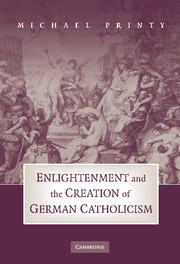Book contents
- Frontmatter
- Contents
- Acknowledgments
- 1 Introduction
- Part One PERFECT SOCIETIES: RETHINKING THE CHURCH AND THE STATE
- Part Two THE UNIVERSAL CHURCH AND THE UNIVERSAL CLASS
- 6 Catholic Enlightenment and the Search for a Bourgeois Catholicism
- 7 A Program for Reform
- 8 Pastors of Enlightenment: Reforming the Secular Clergy
- 9 Gallican Longings: Nation and Religion in the German Enlightenment
- 10 Conclusion
- Bibliography
- Index
10 - Conclusion
Published online by Cambridge University Press: 02 July 2009
- Frontmatter
- Contents
- Acknowledgments
- 1 Introduction
- Part One PERFECT SOCIETIES: RETHINKING THE CHURCH AND THE STATE
- Part Two THE UNIVERSAL CHURCH AND THE UNIVERSAL CLASS
- 6 Catholic Enlightenment and the Search for a Bourgeois Catholicism
- 7 A Program for Reform
- 8 Pastors of Enlightenment: Reforming the Secular Clergy
- 9 Gallican Longings: Nation and Religion in the German Enlightenment
- 10 Conclusion
- Bibliography
- Index
Summary
ENLIGHTENMENT AND THE CREATION OF GERMAN CATHOLICISM
In the end, there was Napoleon. The destruction of the Reichskirche removed the conditions that had allowed German Catholics to rethink the church. But this does not mean that the effort was all for naught. In rethinking the church in the eighteenth century, German Catholics entered a new century of revolution and upheaval with a greater sense of identity and cohesion than they had at the close of the seventeenth century. A lasting legacy of the katholische Aufklärung, therefore, was the articulation of an entity that could survive the collapse of its own legal underpinnings. Moreover, in recognizing that the church could be rethought in the eighteenth century, German Catholics were well-prepared for the intellectual task of rebuilding. As the tensions and contradictions of the katholische Aufklärung themselves reveal, the idea of a cohesive German Catholic church did not preclude radical differences of visions about the nature of that church.
The first task at hand, however, was reconstruction. While many were happy to see the old aristocratic German church brought to an end, the Secularization of 1803 (as drawn up in the Peace of Lunéville and formalized with the Reichsdeputationshauptschluss) did not in any way solve the long-standing problems facing the German church. These included such issues as large ungovernable dioceses, inadequate training of clergy, deficiency of proper episcopal authority in areas of Catholic diaspora in Protestant territories, and the fact that territorial and ecclesiastical boundaries often did not coincide.
- Type
- Chapter
- Information
- Enlightenment and the Creation of German Catholicism , pp. 212 - 220Publisher: Cambridge University PressPrint publication year: 2009

